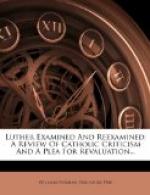“What is here stated will excite less surprise if it be remembered that Egypt was the land where this mode of life had its origin. For that country, from some law of nature, has always produced a greater number of gloomy and hypochondriac or melancholy persons than any other; and it still does so. Here it was long before the Savior’s birth, not only the Essenes and Therapeutae—those Jewish sects, composed of persons with a morbid melancholy, or rather partially deranged—had their chief residence; but many others also, that they might better please the gods, withdrew themselves as by the instinct of nature from commerce with men and with all pleasures of life. From Egypt this mode of life passed into Syria and the neighboring countries, which in like manner always abounded with unsociable and austere individuals: and from the East it was at last introduced among the nations of Europe. Hence the numerous maladies which still deform the Christian world; hence the celibacy of the clergy; hence the numerous herds of monks; hence the two species of life, the theoretical and mystical.” (Eccles. Hist., I, 128 f.)
One may well feel pity for the original monks. Their zeal was heroic, but it was spent upon an issue that is in its very root and core a haughty presumption and a lie. Exhaust all the Scripture-texts which speak of indwelling sin, of the lust that rages in our members, of the duty to keep the body under by fasting and vigilance, and there will not be found enough Bible to cover the nakedness of the monastic principle. Its fundamental thought of a select type of piety to be attained by spectacular efforts at self-mortification flies in the face of the doctrine that we are rid of sin and sanctified by divine grace alone. Monkish holiness is a slander of the Redeemer’s all-sufficient sacrifice for sin and of the work of the Holy Spirit. It started in paganism, and wants to drag Christianity back into paganism.
But monasticism in Luther’s day was no longer of the sort which one may view with a pathetic interest. The old monastic ideals had been largely abandoned. Instead of crucifying the flesh, the monks were nursing and fondling carnal-mindedness. The cloisters had become cesspools of corruption. Because the reputation of monks was utterly bad, and monks were publicly scorned and derided, Luther’s friends tried to dissuade him from entering the cloister. That was the reason, too, why Luther’s father was so deeply shocked when he heard of what his Martin had done, and Luther had to assure his father that he had not gone into the herd of monks to seek what people believed men sought in that profligate company. For that reason, too, he had chosen the Augustinian order, because a strong reform movement had been started in that order, and its reputation was better than that of the other orders. Luther meant to be a monk of the original type.




